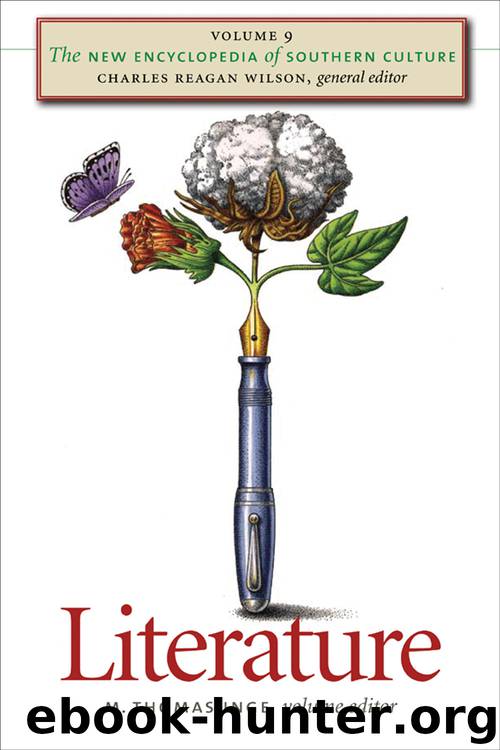Volume 9: Literature by M. Thomas Inge

Author:M. Thomas Inge
Language: eng
Format: epub
Publisher: The University of North Carolina Press
Published: 2008-04-14T16:00:00+00:00
Forrest Anderson, Yemassee (Spring 2004); Shashank Bengali, Trojan Family Magazine (Winter 2005); Callaloo Special Issue: Percival Everett (Spring 2005), with guest editor James Kincaid.
Faulkner, William
(1897–1962) WRITER.
William Cuthbert Faulkner was born on 25 September 1897, in New Albany, Miss. The great grandson of William Clark Falkner, a southern novelist and Confederate officer, Faulkner was responsible for adding the u to his family name—just as he was responsible for transmogrifying his native South into a universal place of the imagination in brilliant novels and stories that have put him first among 20th-century American writers of prose fiction.
Faulkner came to maturity at a time when Mississippi and the South were changing. He grew up a part of post–Civil War southern culture, which was dominated by memories of the Old South and the war, and yet he experienced also the modernizing forces of the early 20th century in the region. He had romantic instincts, expressed in his early poetry and prose and in his enlistment in the Royal Canadian Air Force in 1918, hoping to be a gallant fighter pilot. He went back to Oxford, Miss., in that same year, though, and pursued work as a writer. Lawyer Phil Stone encouraged him, financially and intellectually, introducing him to the work of modernists such as T. S. Eliot.
Faulkner spent several months in New Orleans in 1925, becoming friends with Sherwood Anderson and other creative talents there, and in July of that year embarked on a walking tour through parts of Europe. With the exception of stints working as a screenwriter in California, he mostly lived thereafter in Mississippi. His first novel, Soldiers’ Pay, appeared in 1926, followed by Mosquitoes in 1927.
All of Faulkner’s major novels reflect his southern rootedness. Beginning with Flags in the Dust (published as Sartoris in 1929), he creates a mythical Mississippi county, Yoknapatawpha, in which his main characters and their families confront not only specifically southern subjects—such as a native Indian population, the Civil War, plantation life, and race relations—but also themes that transcend a regional focus. Absalom, Absalom! (1936), perhaps Faulkner’s greatest achievement, explicitly conjoins his southernness and his universality in the partnership of the southerner, Quentin Compson, and the Canadian, Shreve McCannon, Harvard roommates, whose exploration of the southern past provokes questions about the meaning of history itself.
In The Sound and the Fury (1929), his first great novel, Faulkner depicts several generations of a southern family, the Compsons, with a sophisticated handling of point of view and human voice that is equal to the greatest work of his European contemporaries. In As I Lay Dying (1930), Light in August (1932), The Hamlet (1940), and Go Down, Moses (1942), Faulkner portrays many different kinds and classes of southerners exemplified by the Bundrens, the Snopeses, and the McCaslins; he also conveys penetrating insights into southern Protestantism, miscegenation, and discrimination that again point beyond themselves—especially in the figure of Joe Christmas—to fundamental concerns about the nature of human identity and how it is shaped.
Other leading Faulkner novels include Pylon (1935), The Unvanquished (1938), The Wild Palms (1939), A Fable (1954), and his last major work, The Reivers (1962).
Download
This site does not store any files on its server. We only index and link to content provided by other sites. Please contact the content providers to delete copyright contents if any and email us, we'll remove relevant links or contents immediately.
| Coloring Books for Grown-Ups | Humor |
| Movies | Performing Arts |
| Pop Culture | Puzzles & Games |
| Radio | Sheet Music & Scores |
| Television | Trivia & Fun Facts |
The Social Psychology of Inequality by Unknown(3029)
Make Comics Like the Pros by Greg Pak(2917)
Stacked Decks by The Rotenberg Collection(2883)
Purple Hibiscus by Chimamanda Ngozi Adichie(2852)
The Queen of Nothing by Holly Black(2599)
The Art of Doom by Bethesda(2158)
Life of Elizabeth I by Alison Weir(2085)
Putin's Labyrinth(2022)
The Power of Habit: Why We Do What We Do in Life and Business by Charles Duhigg(2010)
Drawing Down the Moon by Margot Adler(1877)
Things Are What You Make of Them: Life Advice for Creatives by Adam J. Kurtz(1864)
Agency by William Gibson(1830)
Wall and Piece by Banksy(1823)
Art Of Atari by Tim Lapetino(1790)
Teaching to Transgress: Education as the Practice of Freedom (Harvest in Translation) by Bell Hooks(1784)
The Beatles Lyrics by Hunter Davies(1720)
The Pin-Up Art of Bill Ward by Bill Ward(1699)
Only What's Necessary: Charles M. Schulz and the Art of Peanuts by Chip Kidd(1697)
The Andy Warhol Diaries by Andy Warhol(1604)
